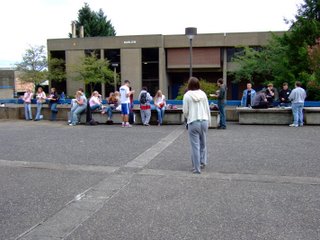Over the next week or so, I plan to share a little about what has transpired in my outlook toward ministry over the last several months. As mentioned
here, I have been searching for answers to some big-picture questions that will impact how I lead the Portland Campus team to reach the 100,000 students in our city. I am just beginning to solidify some answers. Bear with me.
I have had a growing discontent in the last two years with "ministry" in general. This has had nothing to do with Campus Crusade, or any church, or person, or our calling to ministry. It is simply what I have seen and experienced as I have watched 'Christianity' try to engage with non-Christians. What I have seen has in many instances been frustrating and discouraging to me.
I have noticed three things that seem to be thematic. The first theme is that ministry can tend to be extremely
formulaic. We find something that works and we rush to apply it in every situation. We begin to view people as numbers or statistics. I have heard analyses that if you share the gospel with
x number of people, than
y will become Christian. I have also seen outmoded strategies clung to because at one time they connected with people.
I have also sensed
passivity in ministry. So often we go through the motions and wait for things to happen, wait for people to show up, wait for change to make a decision for us, etc. I see this a differing from 'waiting on the Lord', where His servants are eager and expectant that God will move and are ready for Him to do so. I am referring to a rut, or routine, that we pursue in hopes of God sanctifying our trudge.
Third, I see a growing
irrelevancy. Those outside the church believe we have nothing to offer, and that there is no reason to respect our beliefs. This saddens me because even though their anger and apathy might be directed toward us as people, it really keeps them from knowing Jesus. We as Christians are viewed as being anti-this or anti-that, or as being a political movement with great voter turnout. We are viewed as outsiders and separatists, who stand at a distance and bark proclamations to a largely ambivalent and growingly hostile crowd, with which we have no affinity.
These observations are certainly not true everywhere, but I believe that in time they will be, unless changes happen. They are certainly largely true on any campus anywhere in the country.
The question I keep hearing in my head is, "Is the Gospel powerful, or is it not powerful? Are there circumstances where Jesus cannot change people's lives?" I believe that the answer to that is, "
Absolutely not!" Daniel 7:13-14 gives a shocking picture of Jesus as having been given "all glory, authority, and sovereign power."
"All" is a really big word.
So, my journey has led me to this point: If there is a disconnect between the power of the Gospel and the impact of the message, where is that disconnect and what causes it? There are only a few possibilities:
One, that Jesus in fact cannot exercise his power everywhere;
two, that some non-Christians do not in fact need Jesus; or
three, that we as Christians are somehow not communicating the Gospel very well.
I cannot accept either of the first two possibilities as true. I have therefore concluded that the third is where the disconnect lies. If I am right, that we don't do a good job communcating the Gospel, then this dictates our response.
I will share more about that response in the next few days. Thanks for reading this far!




























